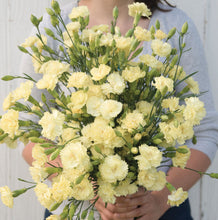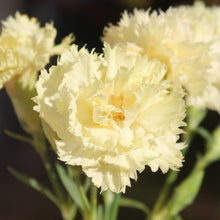Up for sale is one pack of 100 Marie Chabaud Yellow French Carnation seeds. Perfect for summer blooms these flowers are double petaled flowers that create large 3" blooms in a very soft pastel yellow.
French Carnations are Chabaud and Grenadin varieties that are similar to traditional carnations but they have double fringed petaled blooms that give them a fuller appearance. The Marie carnation is from the Chabaud series.
We offer flat rate combined shipping on all orders, no limit on the amount or type of seed packets.
CULTURE
Soil temperature: 70 degrees fahrenheit
Germination lighting: Light required
Depth: 1/8"
Germination days: 12 days
Plant spread: 20"
Plant height: 24''
Plant type: Tender Perennial
Maturation days: 120 days
Treat as a tender perennial in mild zones and as an annual in areas that get a hard freeze in winter. In spring loosen enriched garden soil to a fine consistency down to a 6" depth. Carnations prefer a higher PH in the 6.5 to 7 range, but will also grow in PH levels down to 6. Carnations dislike soggy conditions so place in them in a raised garden bed. It's best to start carnations in pots 8 weeks before your last frost as they take some time to mature enough to create flowers and dislike hot summer weather. They require light to germinate so sow on the surface and very lightly dust with sand, vermiculite, or peat. While young keep plants cool and once they are 6" tall pinch out the center to encourage bushy growth. Transplant to the garden after you last frost. In mild zones you can direct seed in the garden in spring but it is possible they will not have flowers their first year.
Once in the garden, and they get over developed and start to show decline, divide and transplant.




